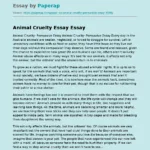Throughout history, the relationship between humans and animals has oscillated between companionship and exploitation. The question of whether animal ownership should be banned to mitigate cruelty calls for profound introspection and a reexamination of societal norms. This discourse transcends mere legality, delving into ethical implications, the psychological benefits of companionship, and the complexities of animal welfare. The exploration of this topic illuminates the multifaceted nature of ownership and cruelty.
First, it is imperative to understand what constitutes animal cruelty. This term encompasses a spectrum of behaviors, ranging from neglect and abandonment to outright abuse. The prevalence of such abuses in households, where animals are purportedly cared for, raises vital questions about the adequacy of current laws and societal attitudes toward animal welfare. A systematic analysis of data on reported cases of animal cruelty reveals alarming trends, indicating that the very framework designed to protect animals often falls short.
Advocates for banning animal ownership posit that this drastic measure could serve as a panacea for the issue of cruelty. They argue that by eliminating ownership altogether, we would dismantle the hierarchical structure wherein humans possess dominion over animals. This egalitarian perspective challenges the longstanding belief that animals exist primarily for human benefit. Instead, it emphasizes autonomy for animals, proposing sanctuaries or communal care systems as alternatives to private ownership.
However, this perspective invites scrutiny. The abolition of private ownership may not effectively address the root causes of cruelty. Instead, it could inadvertently create a new set of dilemmas. Consider the potential consequences: who would be responsible for the care of these animals? Would a governmental or organizational system be able to meet the needs of every animal? Historical examples suggest that systems intended to serve the public can often fall short. Humane societies and animal shelters frequently face resource constraints, a reality that complicates the feasibility of a communal care model.
Moreover, the psychological benefits of animal companionship cannot be overlooked. Research indicates that pets can significantly enhance mental health, offering comfort to vulnerable populations, including the elderly and those suffering from anxiety or depression. The unconditional love provided by pets often creates a sense of purpose and belonging. Abolishing ownership in favor of a communal system could deprive many individuals of these critical benefits. Furthermore, it raises ethical questions: Is it just to penalize responsible pet owners for the transgressions of others?
The idea of fostering accountability rather than eliminating ownership merits consideration. Current laws and regulations governing animal ownership often lack stringent enforcement, enabling situations where neglect and abuse flourish. A proposed solution lies in enhancing education and awareness among prospective pet owners, advocating for responsible practices that prioritize the well-being of animals. Imposing stricter regulations regarding breeding, sales, and care of animals could safeguard against cruelty without necessitating an outright ban on ownership.
Moreover, a focus on humane education could cultivate a generation of empathetic individuals. Incorporating animal welfare into school curriculums could nurture compassion from an early age, countering the factors that often lead to cruelty. Initiatives that promote fostering and adoption, rather than purchasing animals, provide additional avenues for responsible ownership, connecting potential pet owners with animals in need of homes while still prioritizing welfare. Through education and proactive measures, society can reshape the narrative around pet ownership, emphasizing the respect and care owed to animals.
Furthermore, it is crucial to tackle the underlying societal issues that contribute to animal cruelty. Poverty, lack of access to veterinary care, and health crises are all societal factors that can exacerbate neglect and abuse. A holistic approach that addresses these root causes may be more effective than the radical solution of banning ownership. Policies that support low-income families in providing adequate care for their pets can mitigate animal suffering and promote a culture of responsibility rather than one of punishment.
International examples of successful animal welfare initiatives offer valuable insights into alternative frameworks. In several countries, community-based programs focusing on neutering, education, and rescue have reduced instances of animal cruelty without necessitating the absence of pet ownership. These models illustrate that with thoughtful policymaking and community involvement, a balance can be struck that promotes both animal welfare and ownership.
Ultimately, the discourse surrounding animal ownership and cruelty is replete with complexities. While the idea of abolishing ownership might seem a straightforward solution, it warrants deeper examination of the implications it would carry. Instead of viewing animal ownership as an inherent source of cruelty, there is potential to redefine what responsible ownership entails. By fostering education, implementing stringent regulations, and addressing societal issues, we can champion a more humane treatment of animals while still embracing the profound bond shared between humans and their pets.
In conclusion, to posit that animal ownership should be banned to eradicate cruelty simplifies a multifaceted issue. It is not merely a decision about legality; it is a societal challenge that necessitates a collaborative and compassionate response. Through ethical contemplation and progressive thought, a future can be envisioned where animals are cherished and protected, without the need for the extreme measure of abolishing ownership entirely.










